Healthcare Funny Video I Dont Need a Diamond Ring Just Put Me on Your Healthcare
Think of your happiest relationships, and there's a good chance each one requires open communication, honesty and trust. That goes for you and your doctor, too. Lie out of embarrassment, and she can't treat you. Show up unshowered to a doctor visit, and she won't want to. Ghost her too many times, and a break-up is inevitable.
Be a better partner and you'll get better healthcare.
To uncover what to do—and what not to do—at the doctor's office, Eat This, Not That! Health talked to the country's top docs to find the #1 things medical professionals say you should avoid at a doctor visit. Read on, and to ensure your health and the health of others, don't miss these Sure Signs You Had COVID and Didn't Know It .
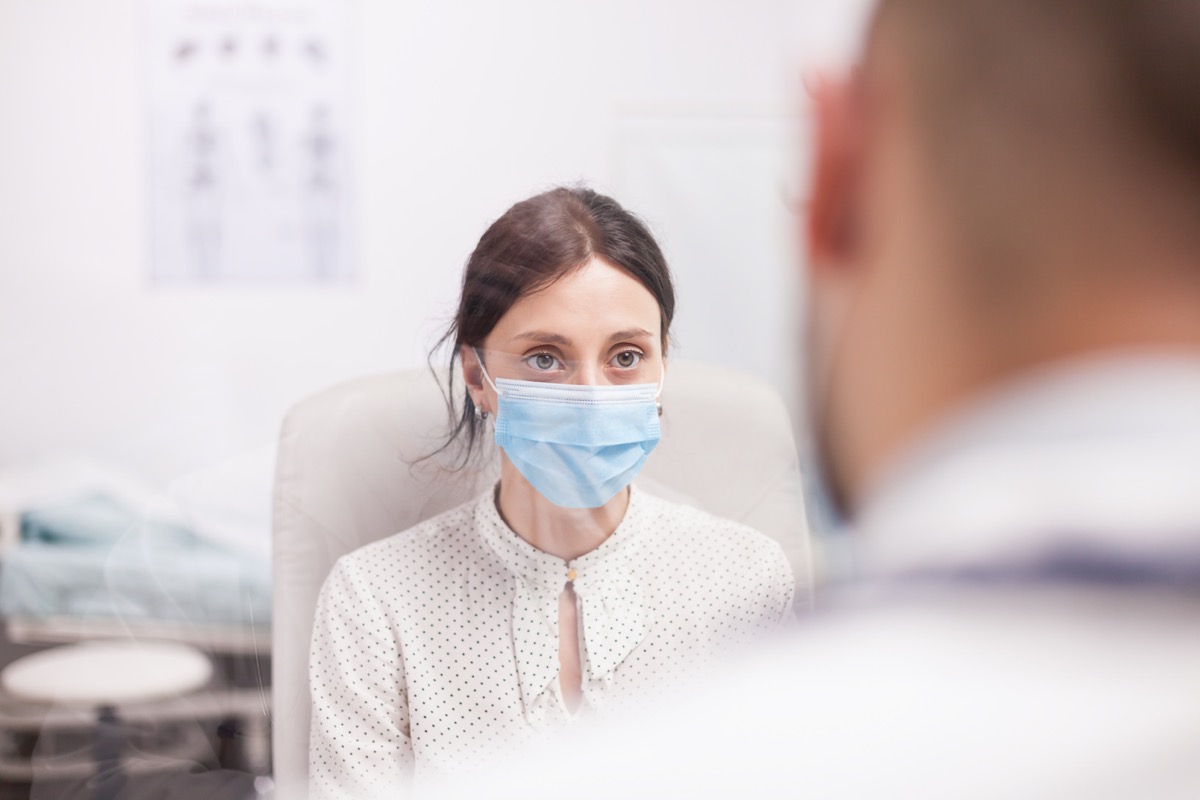
Becoming an active listener, not a passive one, is the No. 1 way to be a better patient, say doctors Mikkael Sekeres and Timothy Gilligan of the Cleveland Clinic. They revealed in the New York Times that too many of their patients nod mechanically at what they're saying, without fully understanding the information being relayed.
The Rx: Asking questions, requesting that the doctor repeat something, taking notes or bringing along a family member who can do any of the above can help you become an active partner in your own care.
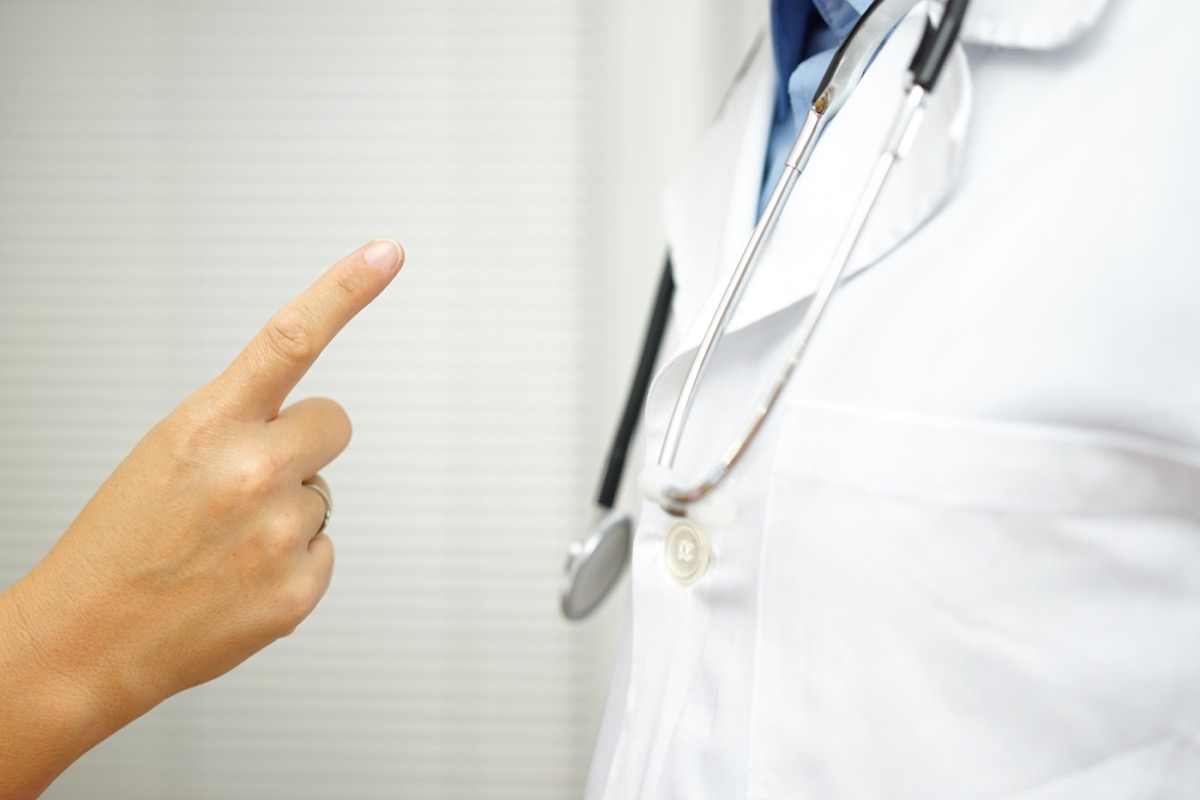
There's a fine line between an active listener and being a know-it-all. Consult Google to self-educate, not self-diagnose, says Suzanne Koven, a primary care internist at Massachusetts General Hospital. "I have enormous respect for patients' autonomy and understanding of their own bodies, and to some extent doctors are working with patients in a collaboration," she told Scientific American. "But to pretend that both parties are bringing the identical degree of information to the table is disingenuous. Once in a while somebody will come in determined that they need an MRI to rule out such and such or this drug to treat such and such, and I'll have to say, 'Whoa, slow down, let's talk about you and your symptoms.'"
The Rx: Do your research. Ask questions about anything you don't understand. But leave the diagnosis to your doctor.

According to a survey conducted by ZocDoc, almost one-quarter of people lie to their doctors. (Women were slightly more likely to like, at 30%, compared to 23% of men.) Embarrassment and fear of being judged were the most common reasons given. Stop it right now! "Sugar-coating bad habits or nagging symptoms does not help," advises David Longworth, MD, of the Cleveland Clinic. "Your doctors are confidential partners in your care. They need all the information available to help you make smart decisions. That includes everything from your habits to every medication you take, including over-the-counter drugs, herbal products, vitamins and supplements. If you aren't consistently taking medication, talk to your doctor about why — including if you can't afford them."
The Rx: Always be candid. Anything less is a waste of time. Leave embarrassment and shame behind. Your doctor is there to improve your health, not nag you.

According to the ZocDoc survey, 64 percent of seniors said they've avoided bringing up health issues with their doctor, because they didn't think the problem was that serious or worth discussing. None of us want to perform a hypochondriac's soliloquy at the doctor's office, but it's not the time for false modesty either.
The Rx: If you think you might get tongue-tied in the moment, write down your symptoms or things you'd like to discuss with your doctor before your visit.

Remember the last time you sat in a waiting room, doing what the room was for, for an hour? That's likely because people before you were late for their appointments, backing up the whole queue. Reinforcing this bit of common sense is a doctor who posted on Reddit: "Every outpatient office has time set aside for sick visits, and time blocked off for pre-scheduled visits," wrote _PyramidHead_. "People will often call in when the office opens and ask for a sick visit to address their sore throat, whatever. More times than I can count, the person will say, 'I can't come in until 4:30,' usually the last slot of the day. Which is fine, but when they then don't show up, I'm annoyed. Especially if the last pre-scheduled visit was as 3:15, and I waited around for an hour — only to have someone not show up."
The Rx: Keep your appointments and be on time. Or call to let the doctor's office know what's going on.
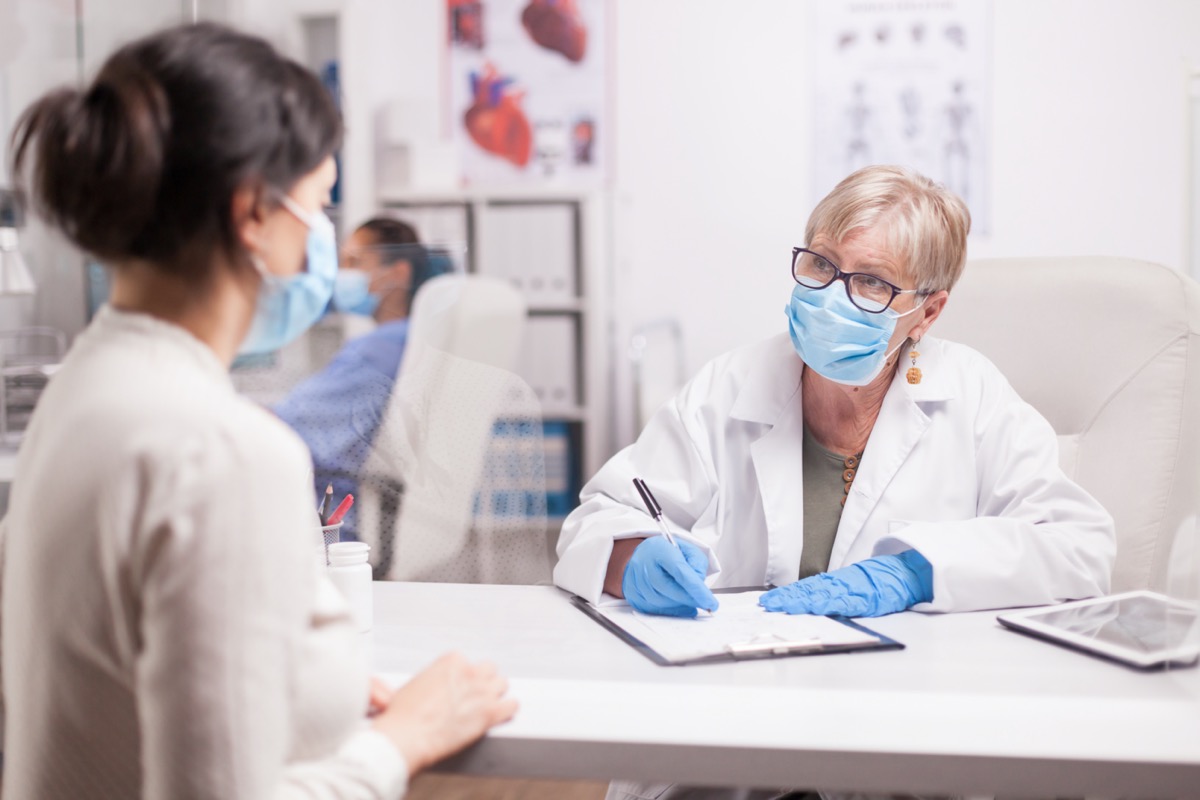
Don't make a scene at the front desk about wait times or rant about a charge mandated by your insurance. "Complaining to the front office staff about your copay is pointless; they have no control over that," wrote Redditor _PyramidHead_.
The Rx: Be proactive: Call ahead to see if the office is running behind if you need to, stay informed about insurance features like your deductible, and read #8 on this list.

This one's common sense (and common courtesy). Unfortunately, judging from postings by medical staff on social media, it's an all-too-common occurrence. Remember when mom asked if you were wearing clean underwear, in case you were in an accident and ended up in a doctor's care? Mom was right.
The Rx: You don't have to prep like it's a date, but be clean.

It's near the bottom of the list of last things any of us want to do: Spend time on the phone with the health insurance company. But if you're having a procedure, need medical devices, or are prescribed new medication, it's better to call ahead and check in than be caught with a bill — and have to spend more time on the phone — after the fact. If you need a colonoscopy, the procedure might be covered, but not a particular facility or anesthesiologist.
The Rx: Call ahead to check. If you have concerns, tell your doctor.

This is a frequent complaint voiced by doctors and other medical professionals. If you're seeing a new doctor who might not have access to your records, he or she won't mind at all if you bring along a cheat sheet with your meds listed. It could prevent drug interactions and big problems down the line.
The Rx: Jot down your medications and dosages and bring the information along to your doctor visit, or keep it on your phone.

Always take medication as prescribed. Failure to do so is one of the top complaints medical professionals voice on social media. On Reddit, a doctor going by the nickname AstralResolve explained their frustration with a common scenario: "'I stopped taking the antibiotics cause I started to feel better. Now I'm sick again and the antibiotics aren't as effective.' Every freaking time. We instruct, you disregard, bugs get stronger and more resistant."
Redditor walrustude, a doctor, said noncompliance based on online research was his top gripe: "Straight up refusal to follow medical advice or to agree to taking one pill a day known to dramatically improve symptoms, all because this mommy blog said the best thing is apple cider vinegar or because WebMD suggested cold showers." Your doctor doesn't mind questions based on your research; just don't present them with something you read online as fact that applies to your particular case.
The Rx: Follow prescription instructions to the letter, and voice any concerns to your doctor.
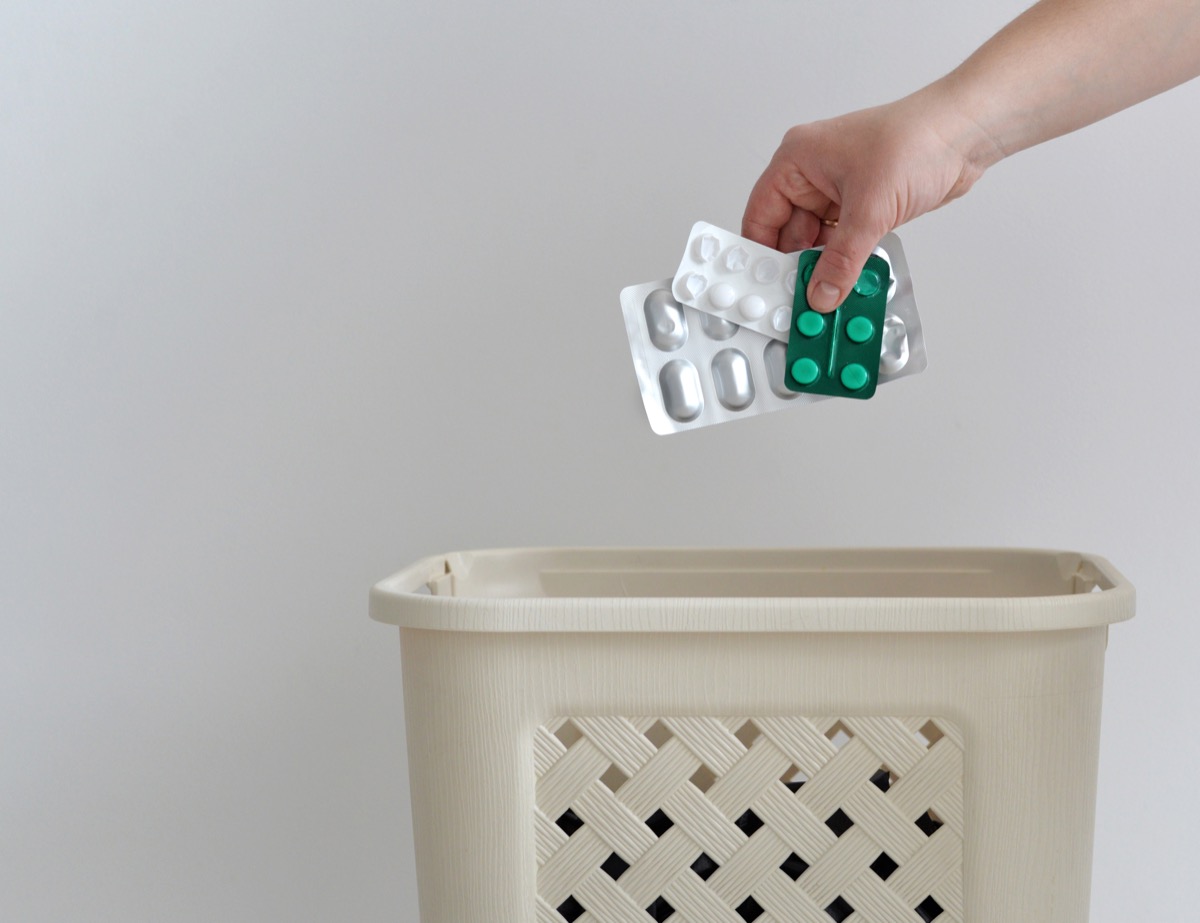
This is another frequent occurrence, medical professionals say. "People stop taking medications all the time, usually because they feel better or can't afford the cost. It's a chronic situation, especially as Americans get older," writes aging expert Barbara Hannah Grufferman on HuffPost. Remember #3 and #4 on this list — a doctor's visit is a time for total honesty. Anything less is counterproductive.
The Rx: Tell your doctor everything. If finances are an issue, be blunt. (Your doctor or office staff may be able to help with co-pay cards or other solutions.)

A second opinion is great. A fifth, not so much. "I'm a huge fan of second opinions," Orly Avitzur, MD, wrote in Consumer Reports. "I encourage my own patients to seek them out when faced with a difficult diagnosis or decision, and I've provided them as well. But there's a limit. A recent patient was paralyzed by indecision after seeking several medical opinions (I was number seven), all with slightly different recommendations. Medicine frequently involves judgment calls, and sooner or later you'll have to trust one of them."
The Rx: Know when to say when. More information isn't always better.

"While I don't yet bring anyone into my doctor's appointments, I do accompany both my mother and mother-in-law to theirs," says Grufferman. "They are 75 and 83, respectively, and a second set of ears and eyes is always a good thing, especially when the doctor is discussing procedures, medicine and follow-up recommendations. In this case, I believe physicians welcome my presence, as long as I don't completely take over. I always take notes and ask the doctor to repeat or review something if I don't understand."
The Rx: Ask well-meaning relatives who come along to your doctor visit to do more listening than talking.
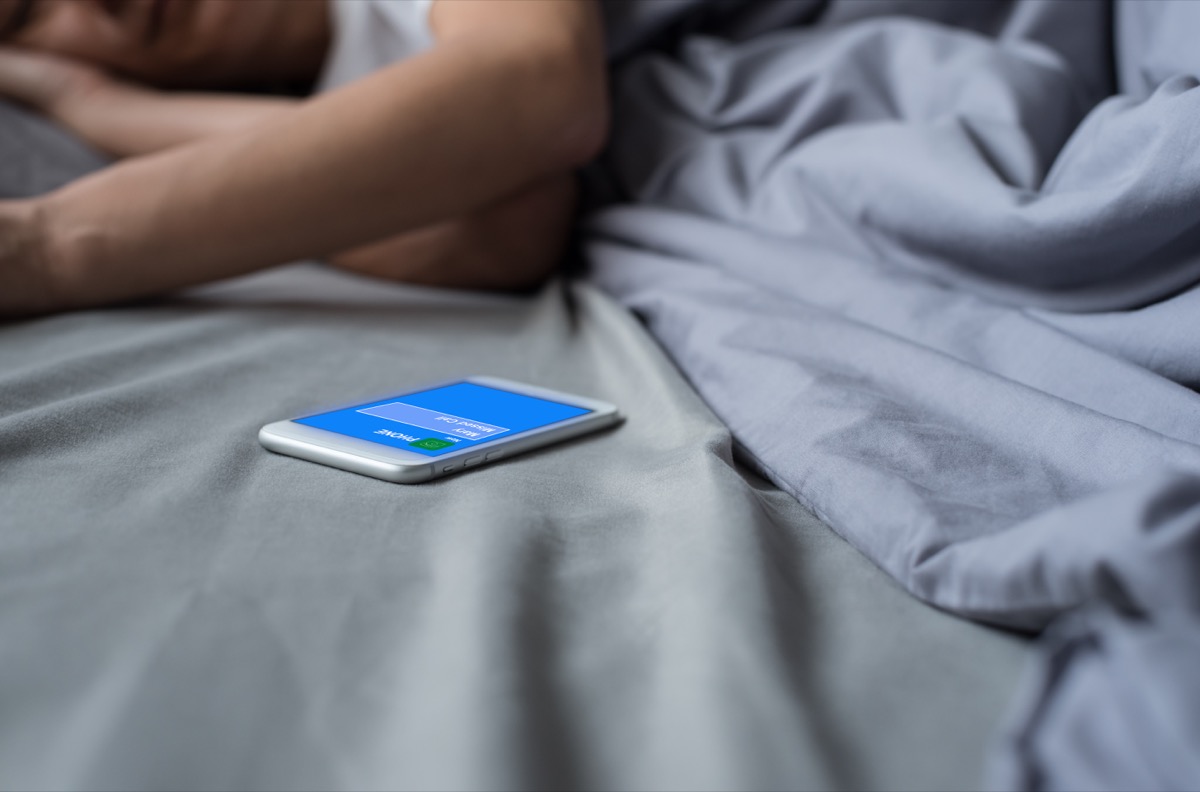
"Not only is not showing up when we were expecting you (and when we have called, texted, emailed, and sometimes all three to remind you that you have an appointment) rude and entitled, it also tells me that my time is not valuable, and that somehow you think you did not have to keep what essentially was a contract that you made with me when you made the appointment," writes California physician Rebecca Levy-Gantt in a piece on Medium titled "How to be a Good Patient".
The Rx: If you can't make your appointment, always let the doctor's office know.

This is a huge no-go. "Sometimes patients will ask me to go back and 'code the visit differently,'" says Levy-Gantt. "I will not change the test codes or the visit codes to accommodate someone, since doing so is fraud, and not an appropriate or legal thing for me to do. Sorry. I will, however go to bat for a patient (and I have) if I think a patient absolutely needs a particular test done, and the insurance company denies it."
The Rx: Don't ask your doctor to cheat the system. It's unethical, and don't you want a physician who's honest at all times?

"Avoid drinking coffee in the waiting room or prior to the visit. This can elevate your blood pressure and make it difficult for the doctor to determine if the patient suffers from high blood pressure or if this is from the effects of coffee," says Joshua Mansour MD, a board-certified hematologist and oncologist.
The Rx: "If you're scheduled in the AM, bring your coffee in hand and drink it following your blood pressure. Also if you are someone who drinks coffee frequently in the AM try to schedule your doctors appointments in the afternoon. Another option is to record your blood pressures at home and bring a log of them," Mansour says.

"For example, some supplements like garlic, ginger and ginko are blood thinners and can cause excessive bleeding during surgeries. It's important for the doctor to know everything the patients are taking so they can make appropriate recommendations," says Dr. Sharona Dayan, DDS, DMSc .
The Rx: "Prior to your appointment, you should write down all your medications (including dosages) and over the counter supplements so you have that handy for the doctor. Also, it is a good idea to have the doctor's office send you the health questionnaires so that you can fill them out at home where you have access to all the information and aren't rushing to get it all done quickly. This will save you time and it will take out the element of guesswork," says Dayan.
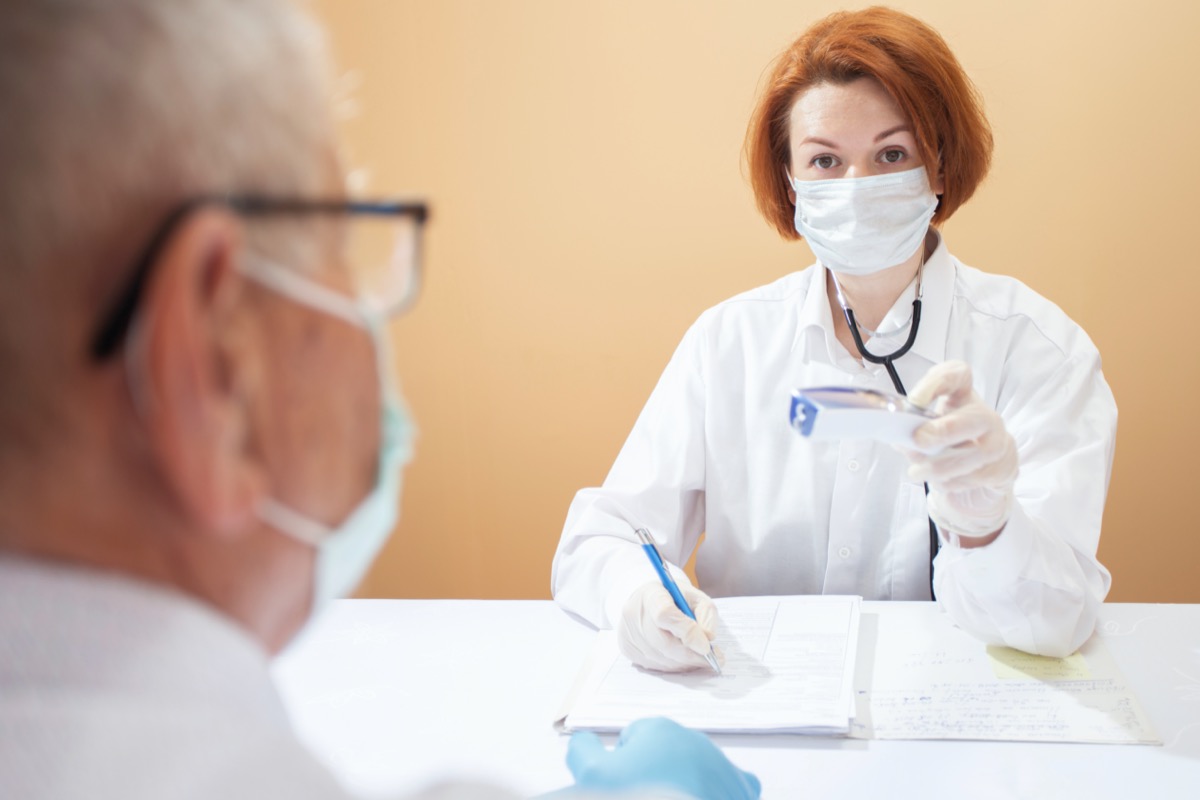
"Trying to explain your concerns off the top of your head during a usual short visit will surely leave out important questions you need to be answered and forgot to ask when the opportunity was there," says Amir G Nasseri, MD, FACOG , of Santa Ana, California.
The Rx: "Think long and hard about your concerns ahead of time and write them down, and amend them as you reconsider," Nasseri recommends.

"Patients sometimes start their physician visits by telling doctors about their minor symptoms—runny nose, stubbed toe—almost as if to throw them a softball to warm them up. Then as the doctor is wrapping things up and about to leave the exam room, the patient finally informs the doc of his/her chest pain or rapid unintentional weight loss. The doctor is rushed and has less time to devote to what was actually the key clue in the case," says Leslie Meserve, MD Chief Medical Officer of CurieMD , Board Certified Internist and NCMP, of Newport Beach, CA.
The Rx: "It's better to list all the symptoms and concerns you're having at the beginning of the visit (or better yet, hand the list to the doc), and then let the doctor triage and determine which symptoms are the most important to handle right away," says Meserve.

"It is very understandable that arranging childcare can be a challenge, but if you bring your small child with you to the doctor's office you are doing yourself a disservice. Fussing, crying, and the general needs of a small child take away the crucial attention of the physician as well as the patient. The child can be a distraction to both of you and the physician may not be able to think as clearly during this crucial visit, and you will not be able to focus on and remember the instructions that the physician gave you. Speaking from experience, there have been occasions where I did not formulate my best plan for my patient because of her small child causing a distraction and later had to call her and amend that plan. Also, very frequently I find myself repeating my explanation to the patient because I can clearly see that she's not paying attention to what I'm saying and instead focusing on calming her child," says Nasseri.
The Rx: "Please do yourself a favor and leave your child at home when visiting your physician," Nasseri recommends.

"If you are having labs done at the visit try to avoid eating prior as this may affect certain lab tests such as cholesterol or glucose and may lead to elevated results that are not typical of the patient," says Mansour.
The Rx: "Your labs don't necessarily need to be done the day of your visit in many instances. Try scheduling them so that it is a time that you are fasting such as early in the AM. You can have them draw early in the AM one day and still see your doctor in the PM a different day and not have to worry about rearranging your lunch," Mansour says.
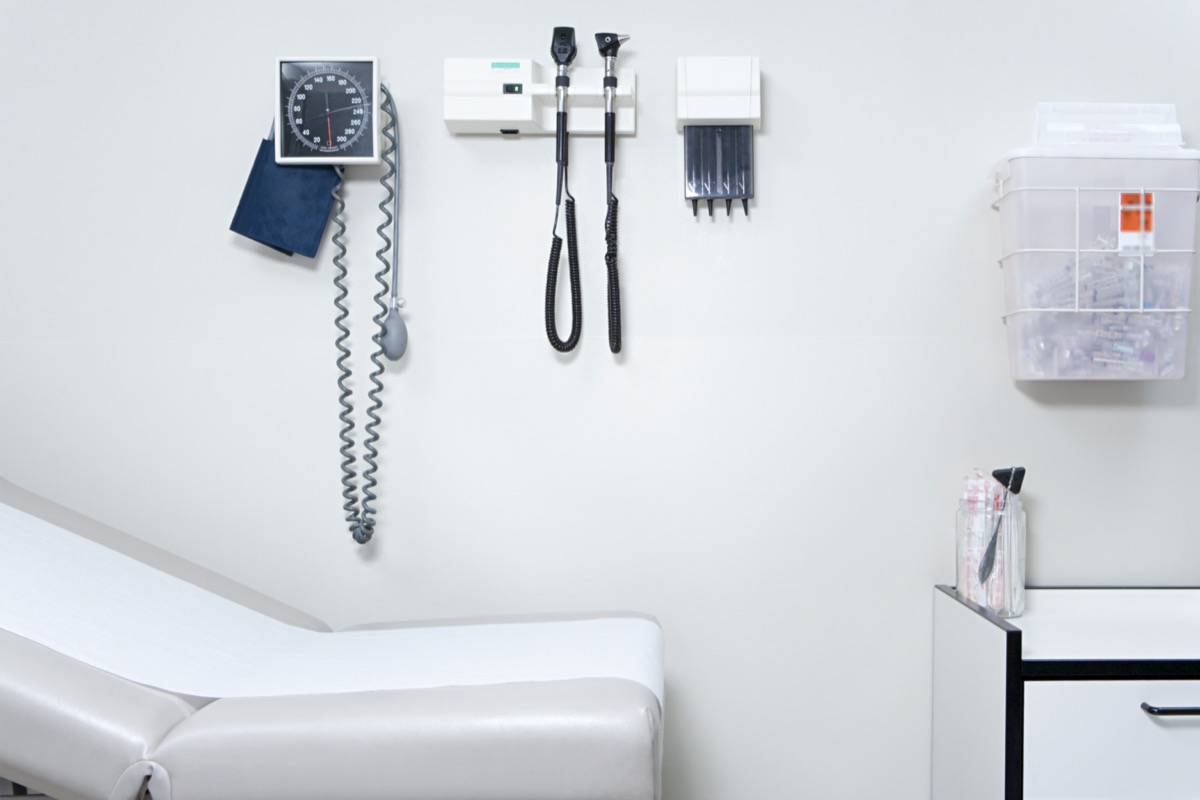
"They are often difficult to replace and can delay the care in other patients," says Mansour.
The Rx: "Although you may be interested in the instrument while you wait, try to avoid playing with them and ask your doctor about whichever one interest you. We are many times happy to show them to you and explain how they work. If you are someone who becomes bored easily try bringing a book to read or listen to music in the meantime," Mansour says.
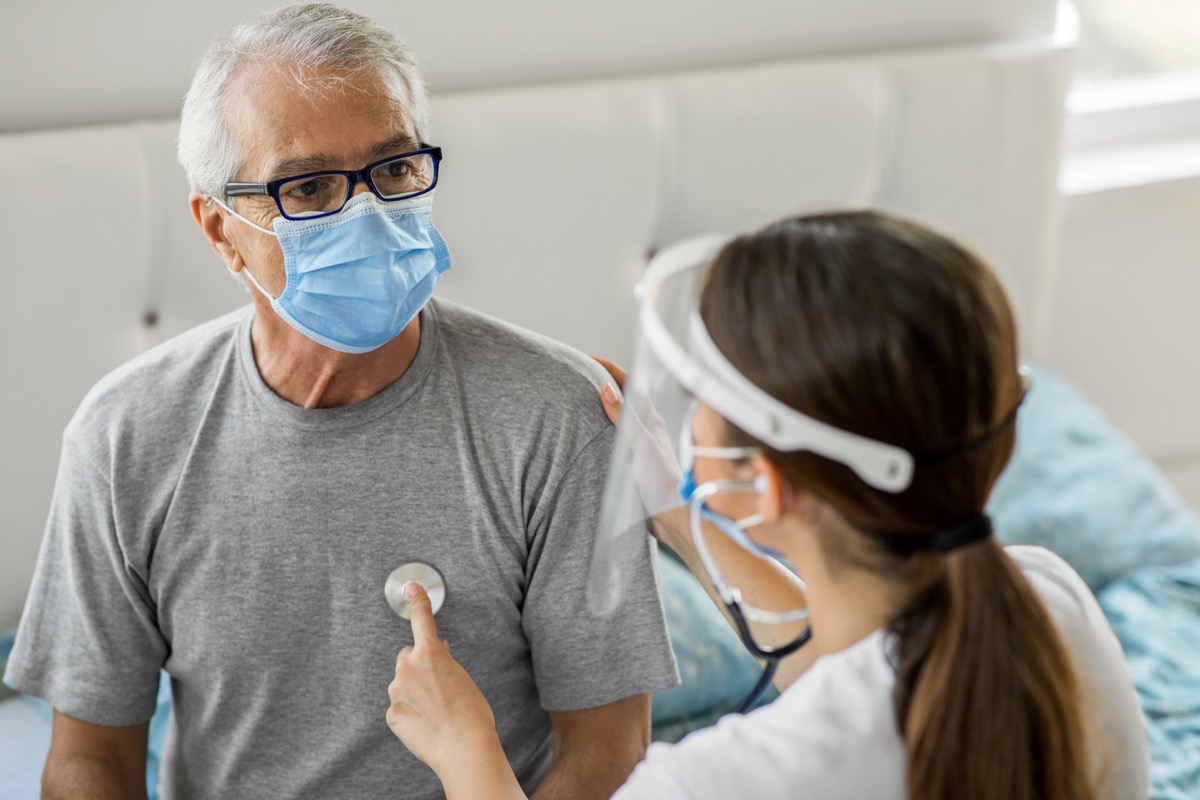
"If you say to a physician, 'I know my body,' it will result in an inner eye-roll on their part that might diminish your credibility. At a certain point, fairly early in their careers, physicians have seen tens of thousands of patients' bodies and you only have experience with the one," says Jennifer A. O'Brien, MSOD, author of The Hospice Doctor's Widow: A Journal .
The Rx: "Say something like, 'Doctor, something just doesn't feel right. Can you help?'" advises O'Brien.

"Doctors are people, too, and prone to input bias. Suggesting a diagnosis can sometimes mislead the doctor and predispose him or her to fall into the same trap as you did and misdiagnose you. They have been a couple of occasions that I almost fell into that trap because I was pursuing the same diagnosis that the patient was convinced she had. It took some stepping back and looking at the evidence more objectively that I was able to step clear of a misdiagnosis," says Nasseri.
The Rx: "Tell the physician your concerns and symptoms, not what you think is going on with you or what you think you have," Nasseri recommends.

"Avoid talking on your cell phone or having it ring at any point during the encounter—from the second you walk in the door until the time you exit the office. It is very frustrating and disruptive on a busy clinic day when a physician walks into an exam room and their patient is talking on the phone. The scenario becomes even more intolerable when they put their finger or hand up to signal that they will only be a minute and worst of all, when the phone rings during the visit and they actually answer the call!" says Sean Peden, MD, Yale Medicine Orthopaedics & Rehabilitation foot and ankle surgeon.
The Rx: "Whether you're on the phone, texting or emailing, put it away and give the doctor your undivided attention. You took time away from your life, drove to the office, paid your copay for some valuable information but you're too busy to listen to what the doctor has to say? Respect your time and respect the doctor's. I've had to walk out on patients who expected me to wait for them to finish their conversation. I have other patients waiting so I move on," says dermatologist Dr. Peterson Pierre , of the Pierre Skin Care Institute in Thousand Oaks, CA.

"The appointment time is set aside for you and your concerns. Don't waste it by trying to get medical advice for someone else: spouse, child, parent, sibling, friend. It doesn't matter," says Pierre.
The Rx: "Make the best of use of your time with the doctor. The best the doctor can do is offer a guess about that other person anyway, if that, so why bother?" Pierre recommends.

"The doctor has set time aside to focus on you and your health. Why ask medical questions about the person who came with you when that person doesn't even have an appointment? It's using up your appointment time, it's disrespectful of the doctor's time, it puts him in an awkward position of providing medical advice with limited information, and it takes time away from other patients who have scheduled appointments," says Pierre.
The Rx: "Don't do it!" stresses Pierre. If you want to help someone else, make a separate appointment.
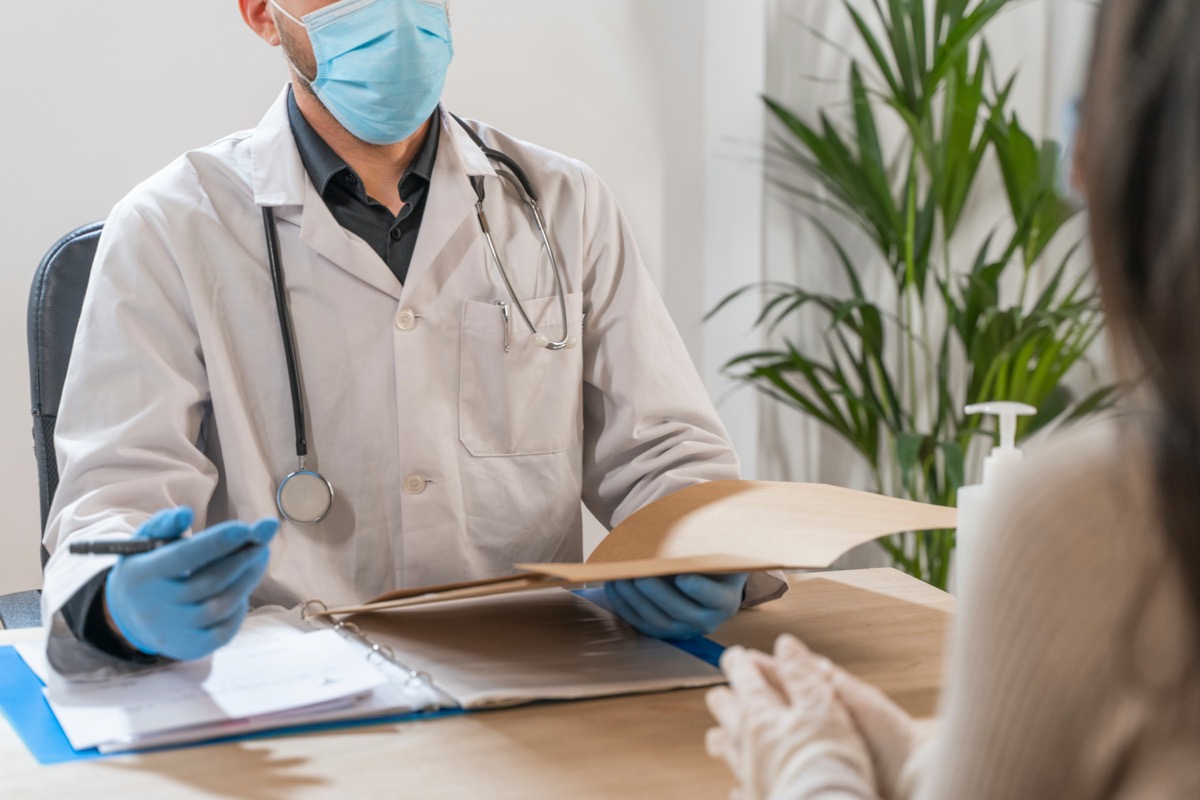
"Never criticize another doctor—this will just put the current doctor on the defensive," says Dr. Laurence Gerlis MA MB BChir (Cantab) MRCP (UK) DPM, CEO & Lead Clinician at SameDayDoctor . That's not all: "If you are seeking a second opinion, never ask the doctor if the other doctor is doing the 'right' or 'wrong' thing. There are very few black and white scenarios in medicine, and most conditions can be treated in different ways," adds Dr. Erin Nance from NanceMD .
The Rx: "It would be reasonable to say that you did not have a good working relationship with a previous doctor rather than specifically criticizing them," Gerlis advises. "Doctors will present you with options for treatment, and then you should work together to choose the option that is best suited for you," says Nance. "Obtaining second opinions is a good way to increase your knowledge about a condition and hear about the different ways to approach a problem. Don't pit your doctors against each other and have an open mind when listening to their recommendations," Nance says.
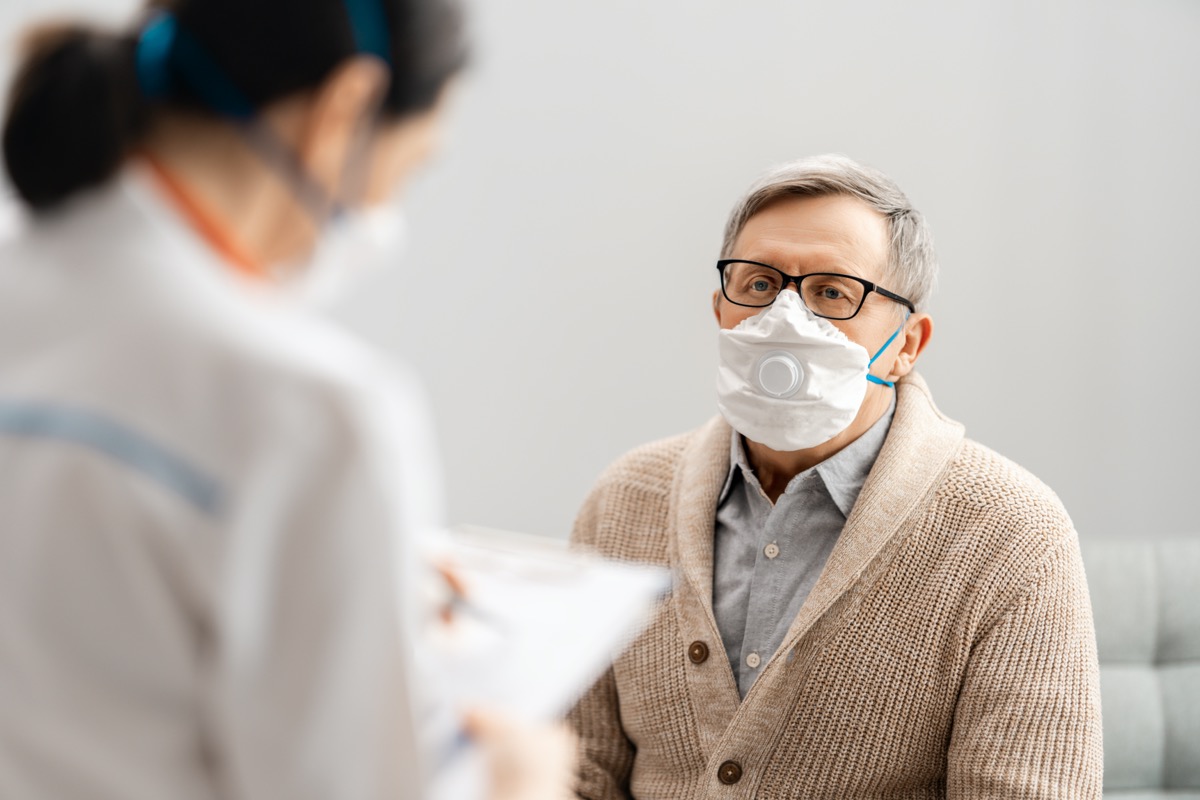
"Never tell the story chronologically i.e. don't start with what your symptoms were three weeks ago. Start with what your symptoms are now!" says Gerlis.
The Rx: Leave storytelling to Morgan Freeman. "Try to keep it simple and succinct. Start with your current problems but trying to indicate how long we've been going on for. Try to keep your problems down to a two-minute dialogue rather than overwhelm the doctor with a detailed 20-minute exposition," Gerlis suggests.

"Never start with a single symptom if you plan to present additional symptoms later on in the consultation. Tell the doctor from square one what all your symptoms are. Nothing is more annoying than the doctor spending 20 minutes dealing with your ingrown toenail only to be told about the breast lump at the end of the consultation," says Gerlis.
The Rx: "It's reasonable to bring a short list of symptoms ideally no more than four or five beyond that it becomes overwhelming and the doctor will just see you as a problem patient," advises Dr. Gerlis.
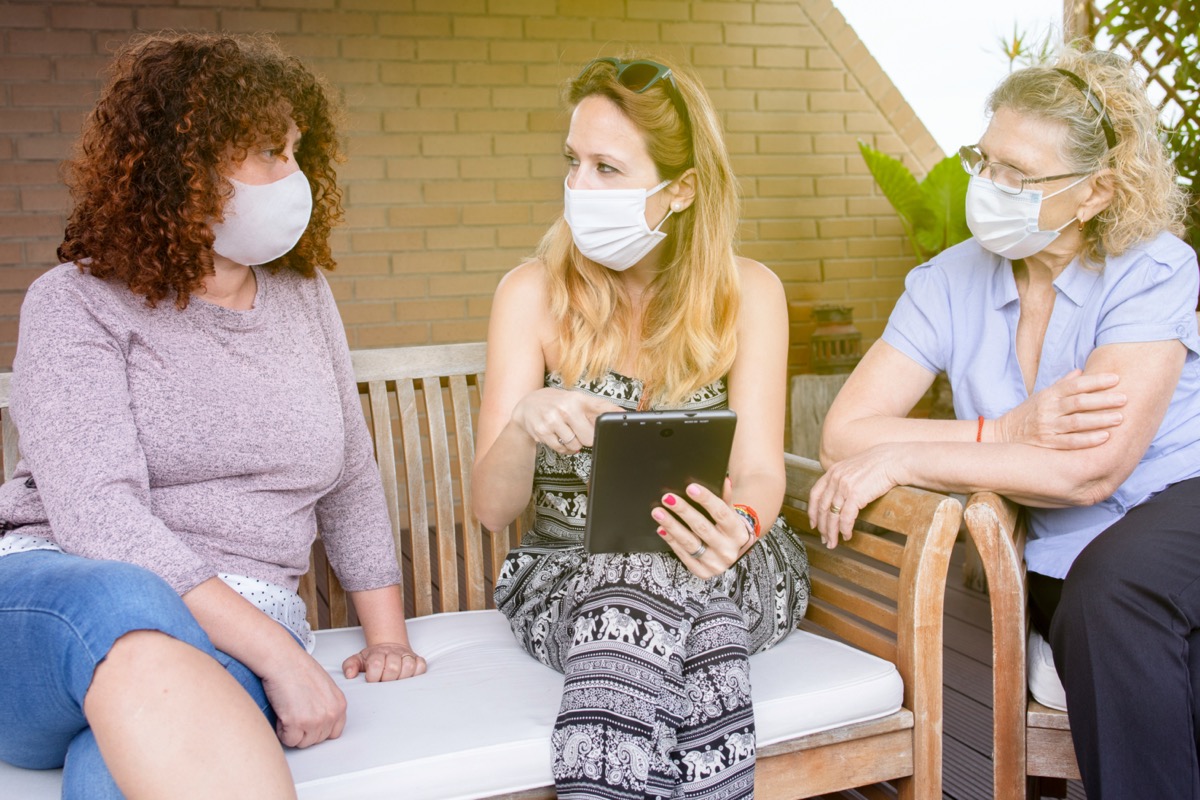
"Never tell them what your friend or neighbor or other non-medical person has told you what is wrong with you!" says Gerlis.
The Rx: Your next door neighbor sure knows a lot about plantar warts, but these are his warts, not yours. "Stick to the opinions of registered medical practitioners and tell your doctor what they have said. Other opinions are not of great value," advises Gerlis.

"When a patient comes in and tells me about how they sued another doctor, it instantly puts me on guard and makes me uncomfortable. Of course, there are times when a doctor was negligent and causes harm to a patient and that patient should be able to receive some kind of compensation for medical bills, inability to work, etc. But here in the USA, this is the wild, wild west of lawyers. Whenever you drive along the highway, you are bombarded by billboards advertising law offices specializing in medical malpractice. Everyone is looking for money, let's face it," says Carissa Alinat, PhD, APRN , Board-Certified Nurse Practitioner.
The Rx: Again—keep your history with other doctors for yourself. "When a patient comes in and tells me about their experience suing a doctor, I am hesitant to become theirs, because you never know what type of person you are dealing with," Alinat advises.
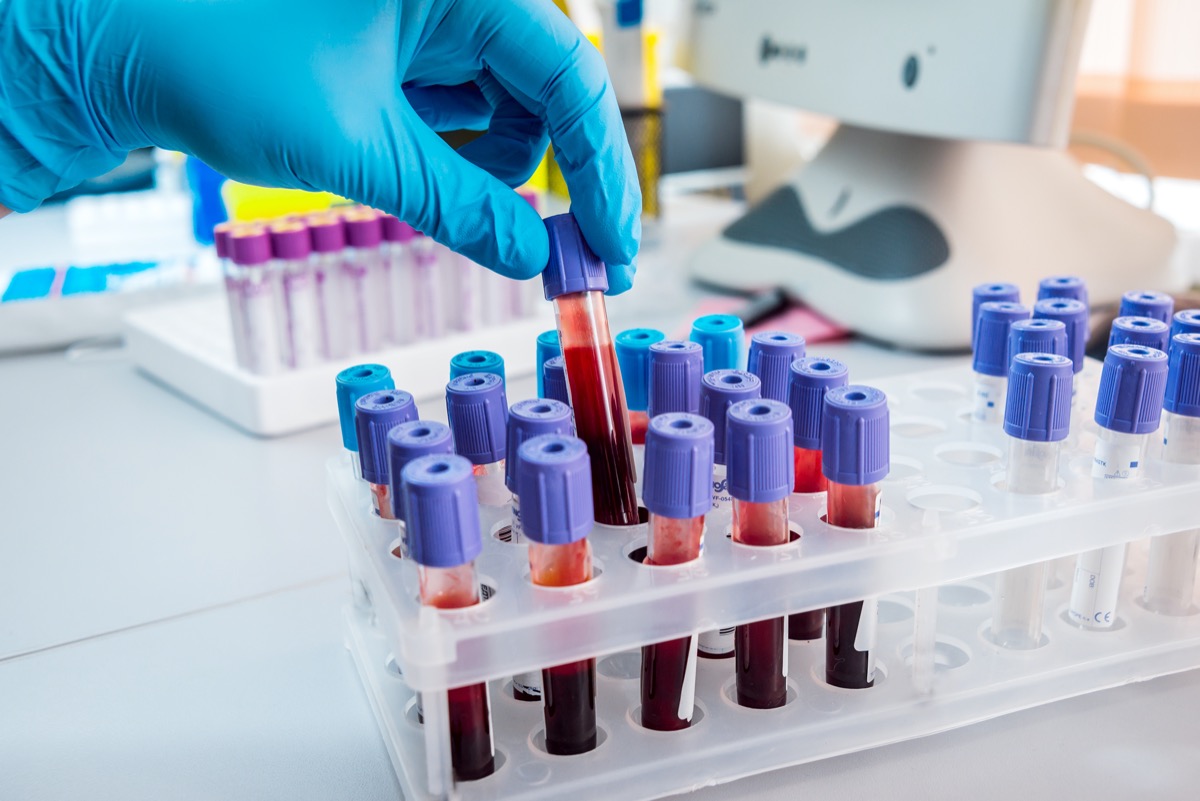
"Sometimes patients will come in for a follow up after starting a medication without having their blood work done first, as instructed to do. Without their blood work, I am unable to do a proper follow up and end up having them reschedule their appointment. This is a loss, as another patient could have filled that appointment, as well as a waste of their time for taking time off work and driving to see me," says Alinat.
The Rx: When instructed to get your blood work, ask where and when; usually, there's a location nearby. Try to knock it out the same day. Many urgent care clinics can do it for you.
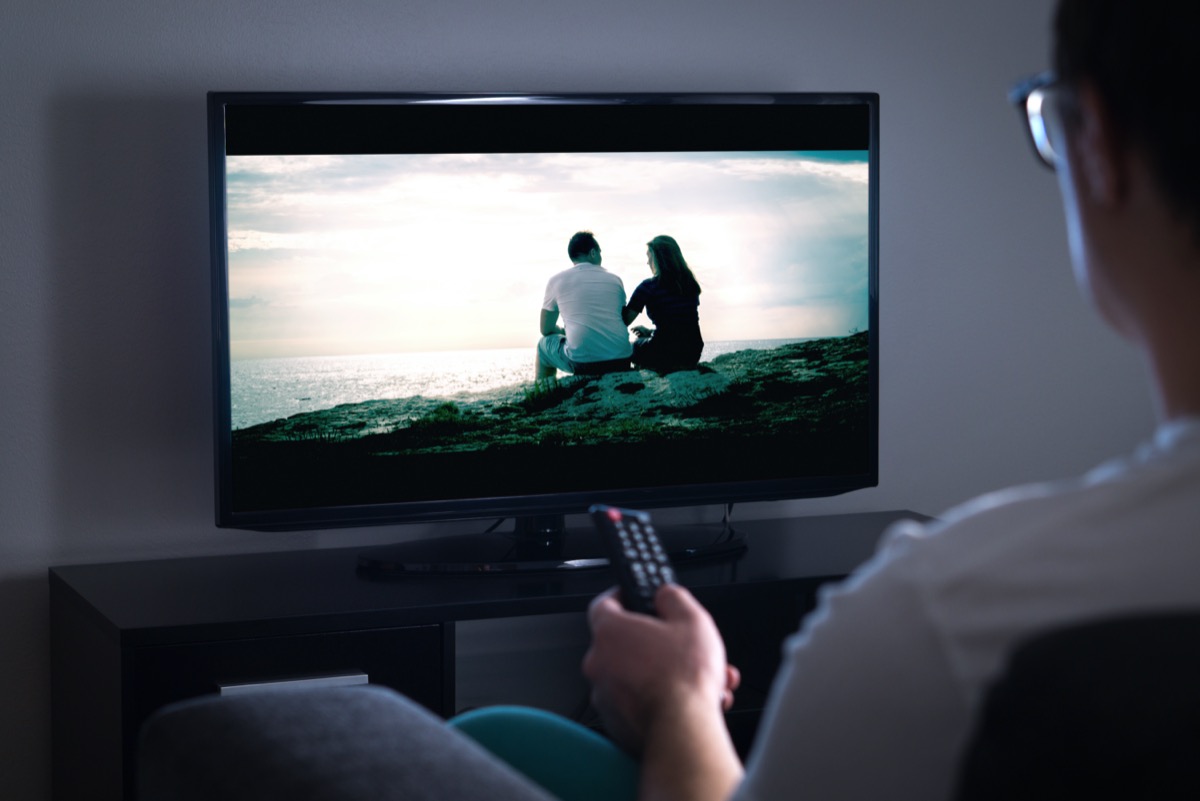
"Don't tell the doctor what medications you need, just because you saw a commercial on TV or read about it on the Internet. I see people saying celery juice will cure your cancer. Don't expect your doctor to be supportive of that kind of thinking," says Elizabeth Landsverk, MD Founder, ElderConsult Geriatric Medicine . That goes for name-brand medications also. "Patients should never go to the doctor's office and demand that the physician prescribe them a medication that they've seen advertised on TV," agrees Yeral Patel , MD, of Newport Beach, California. "Pharmaceutical companies deliberately target consumers with ads that list symptoms that could be attributed to any number of illnesses—nonetheless, that doesn't mean that it's right for everyone or, that the patient even suffers from that particular condition. We want patients to be educated and informed, but sometimes, these advertisements cause undue concern and alarm."
The Rx: As we said before, do not influence the doctor's judgment and allow him/her to make own assessment. "Always seek out evidence-based medicine," Landsverk advises.

"Some people visit the doctor because they're lonely. Social engagement is very important, but don't expect your doctor to fill that void," says Landsverk.
The Rx: "Volunteer or get involved with a group at your local church or community center. Those places are much better ways to connect with other people and feel needed," Landsverk says.
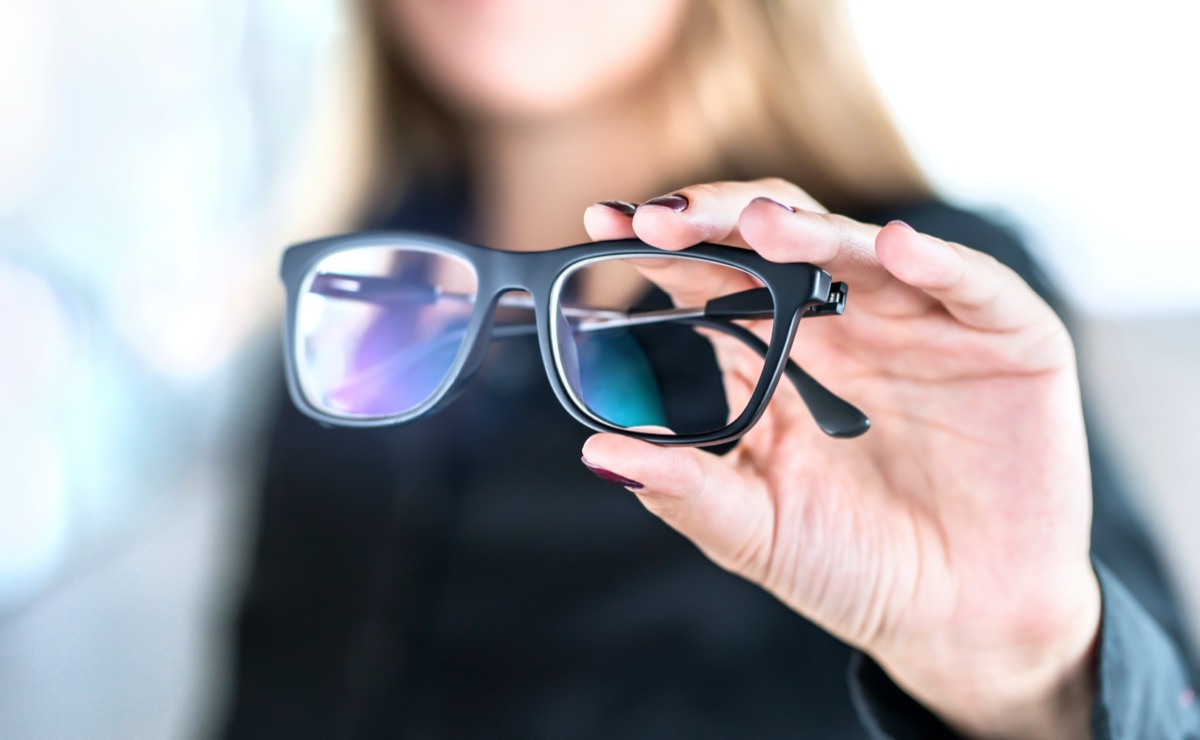
"One mistake patients make when visiting their eye doctor is failing to bring/wear their current glasses or contact lenses. Patients often come in and say 'I hate my old glasses,' but they will not bring them. It is hard to troubleshoot when we do not have the glasses. Also, patients frequently come to contact lens progress visits, specifically designed to check how the contact lenses fit and how vision is with them, without their contact lenses which defeats the purpose of the exam," says Dr. Amanda Chamberlin, Therapeutic Optometrist and Optometric Glaucoma Specialist, Lakeside Vision and Optical , Plano, TX.
The Rx: "Bring in at least your most recent pair of glasses for your doctor to review. If there is a certain pair of glasses you like more than one, even if it's not the most recent one, bring those in too. This way your doctor can give you the most accurate prescription and provide you with your best vision. If you are seeing a new optometrist for the first time, be sure to write down or bring in your current contact lenses, even if you do not like them. I can usually tell what contact lenses a patient is wearing by their description of the box, but this takes the guesswork out of it," Chamberlin says.
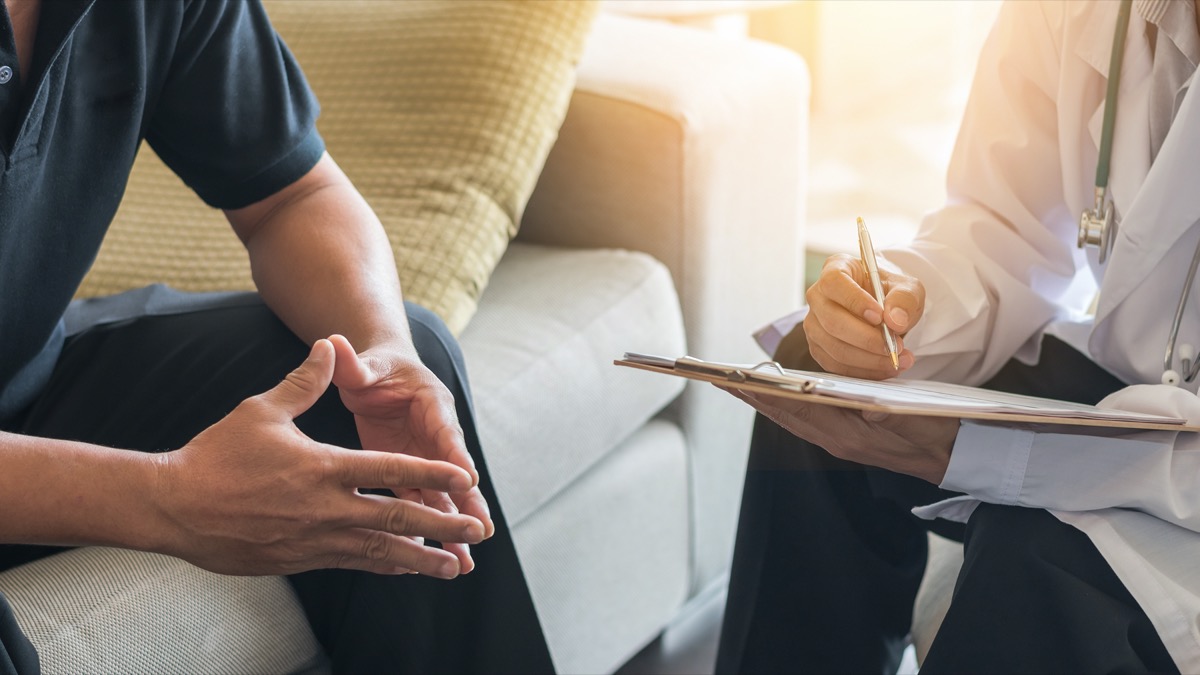
"The biggest mistake I see patients make is failing to disclose their full medical history and the medications they are taking," says Chamberlin. "Patients may think it is not relevant to an optometrist what medications they are taking. On the contrary, there are many conditions that affect the eye that may change the way I diagnose or treat a patient. Furthermore, many medications have ocular side effects, which may help explain a new symptom a patient is experiencing. This is especially important for patients with diabetes. Diabetes can have major effects on the eye and it is important to perform a diabetic eye exam every year to check for diabetic retinopathy."
The Rx: "Always tell any doctor you see, regardless of the reason you are seeing them, what medications you are taking and why you are taking them. It may feel awkward for some medications, but do not be shy! We are all medical professionals and we do not judge! For example, medications like Viagra can cause complications during cataract surgery. It is imperative the cataract surgeon know this before the operation, so he or she can be prepared." Chamberlin advises.
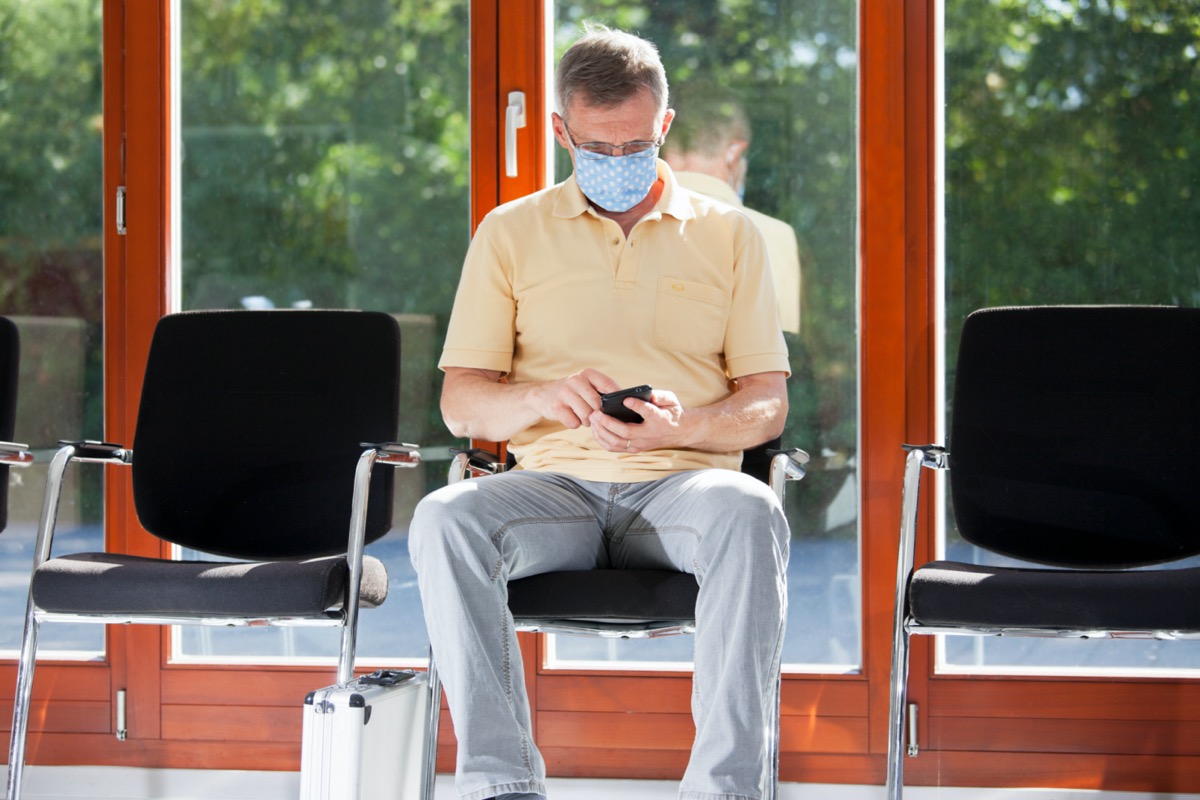
"Do not discuss your health in the waiting room. While anything you say in a doctor's room is confidential, other patrons in the waiting room are not beholden to the same confidentiality rules," says Dr. Erin Nance .
The Rx: There are plenty of perfectly socially acceptable topics you can discuss with other people in the waiting room. Ask your neighbor about a TV show or a book—you can't go wrong with mentioning Baby Yoda, the oldest baby in the history of television. If you don't trust yourself, take a book or download TV show on your mobile phone, but make sure you don't forget your headphones. "Save your complaints for your conversation with the doctor," says Nance.

"Never bring a baby with a dirty diaper into the consultation room. It's very uncomfortable doing a consultation to the rising aroma of a soiled nappy and often a wailing child!" says Dr. Deborah Lee from Dr Fox Online Pharmacy .
The Rx: "Change your baby's diaper before you enter, please!" stresses Dr. Lee.

"It can be hard not to confuse their friendly manner with the fact they are still professionals and are not able to become your best friend! This makes them feel uncomfortable as they don't know how to refuse and again it's time-wasting. The General Medical Council (GMC) has issued guidance on maintaining a professional relationship with your GP," says Lee.
The Rx: "Just don't do this! Keep your relationship on a professional level," says Lee.

"Never take gifts for your doctor into the consultation room. Many practices have a policy that doctors are not allowed to receive presents from patients however well-meaning. If in doubt, take a look at this guidance from The American Medical Association about accepting presents from patients," says Lee.
The Rx: "If you want to give a gift you can make a donation via the manager to the practice fund," Lee advises.
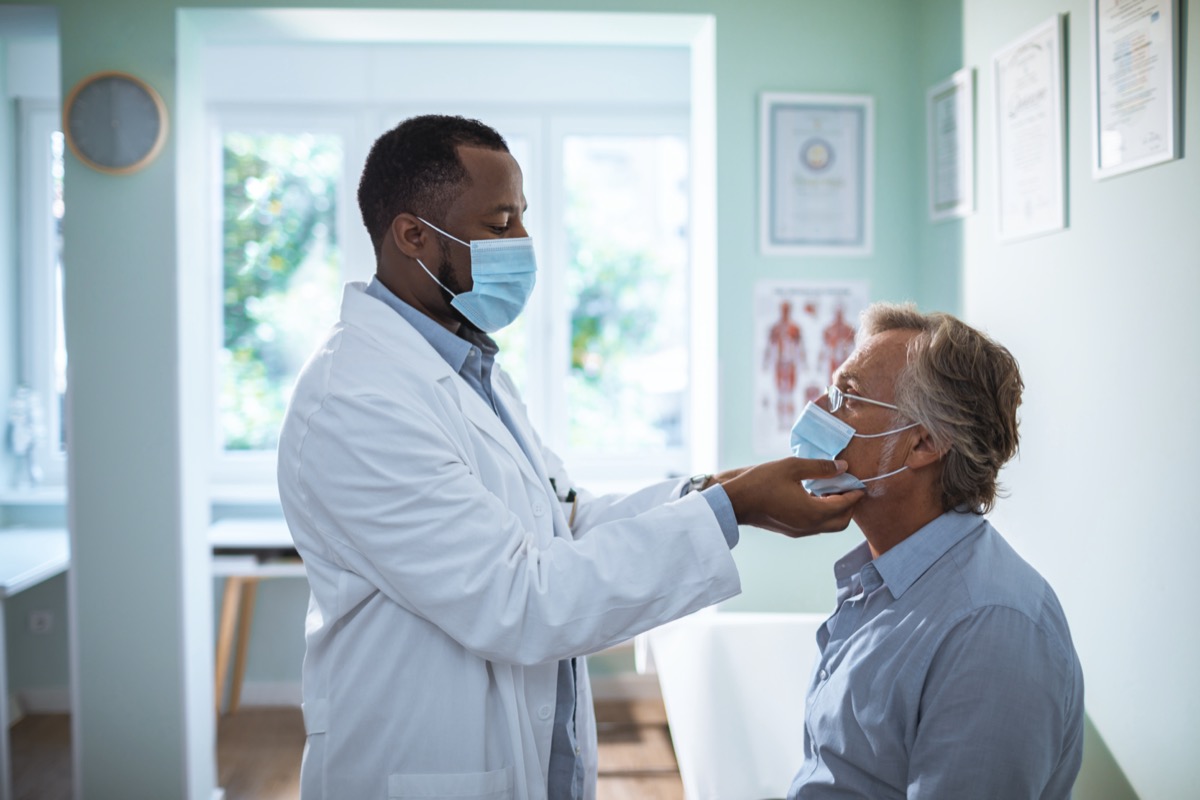
"Never name drop or brag about how many other doctors or medical professionals you know— this can be irritating. Many authorities regard name-dropping as a kind of cheating . It doesn't matter who you know—the access to treatment should be the same after all," says Lee.
The Rx: An editor on the story you're reading once met Lady Gaga but he hasn't told his proctologist. "Your doctor is top-notch and needs to stay there!" says Lee.

"Never take pets in with you to see the doctor, apart from guide-dogs. The Cooperative of American Physicians for example, only recommends service dogs, or dogs for emotional support be allowed in the consultation. Other dogs as pets should be left at home," says Lee.
The Rx: Plan ahead. "You need to arrange to leave your pet at home," says Lee.

"Never fail to listen properly in the consultation. The art of listening is very different from hearing what is said. Listening is an essential communication skill learned in medicine," says Lee.
The Rx: "Do make eye contact with the doctor and actively listen to what is being said," says Lee. Most appointments are shorter than an episode of Modern Family. Stay alert during that time—your body will thank you.
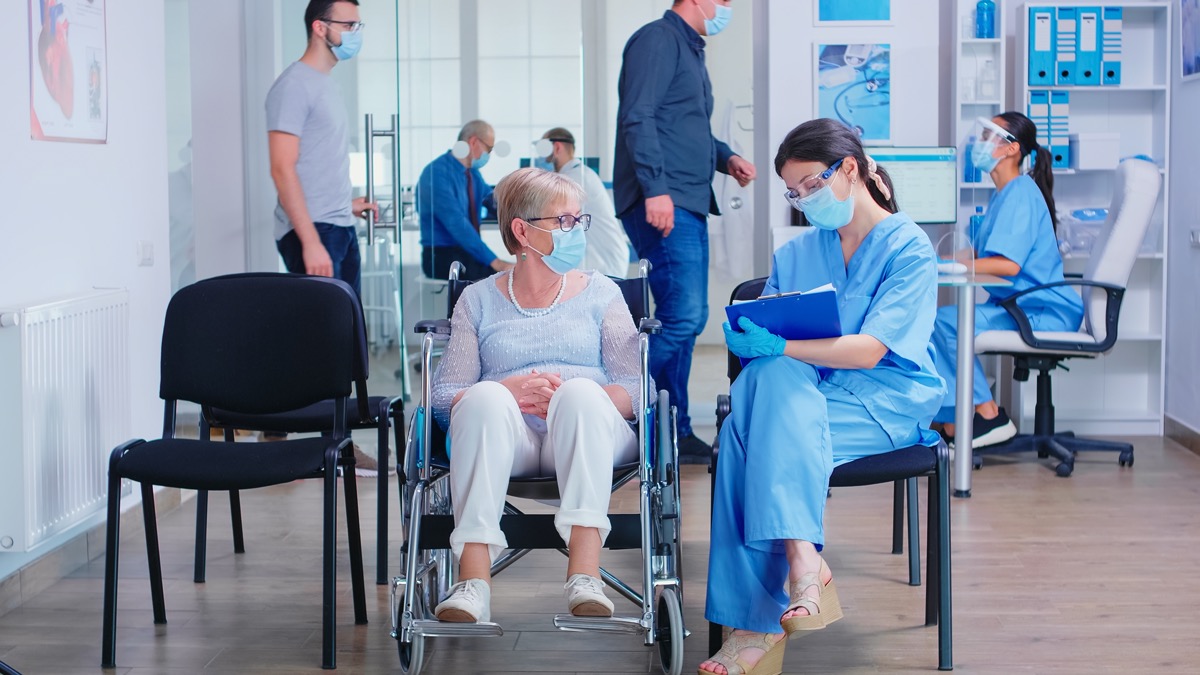
"You should refrain from eavesdropping on other patients' conversations, especially when they are talking to the doctor or medical staff. Medical information is meant to be strictly confidential. Doctors' offices take many precautions to keep it that way, but incidental disclosures can occur in common areas such as the waiting room or reception desk," says Dr. Velimir Petkov a board-certified podiatrist with over 13 years of professional experience from Clifton, NJ.
The Rx: "If you happen to overhear details about another person's condition, symptoms or treatment, resist the urge to comment or offer your input. Your desire to provide help or advice might be coming from a good place. But many people can be sensitive when it comes to their health. Respect their privacy," says Petkov.

"Never risk spreading any of your own infections to other patients. A single sneeze releases 40,000 droplet particles! Flu viruses can live for 24 hours on your hand," says Lee.
The Rx: 40,000!!! Imagine a full Yankee Stadium with virus particles instead of Yankee fans all around you in a small waiting room! What are the chances of escaping one? "Take tissues and use them if you cough, sneeze or blow your nose. Do use hand sanitizer before you go in and after you leave," says Lee.

"Never call the doctor by his or her first name—this is too familiar. This is about the doctor-patient relationship and maintaining boundaries. Keep it simple and don't overstep the mark," says Lee.
The Rx: Always call the doctor, "Dr." They worked hard to gain that title! Although they try to put you at your ease, they are doing a job and need to be regarded within their job role.

"Never wear clothes/shoes that are fiddly or difficult to remove. Speed is of the essence here. The doctor ends up giving you a hand—doing up hooks and eyes, zipping up zips, fastening buttons and doing up shoelaces! This for sure is not part of their medical contract!" says Lee.
The Rx: "Always wear clothes/shoes you can slip on and off quickly without too many fasteners or laces," says Dr. Lee.

"Don't roll out of bed and go to the doctor's office. You will attract unwanted, negative attention. Worse yet, it will not help your care," says Dr. Margaret Aranda of Your Doctors Online .
The Rx: If you have an early appointment set up an alarm clock the night before. If you are on owl, set up two. It will allow you to prepare and improve the quality of your visit. "Dressing up—and being professionally dressed—gives the doctor's office more ambiance and a better reputation," advises Aranda.
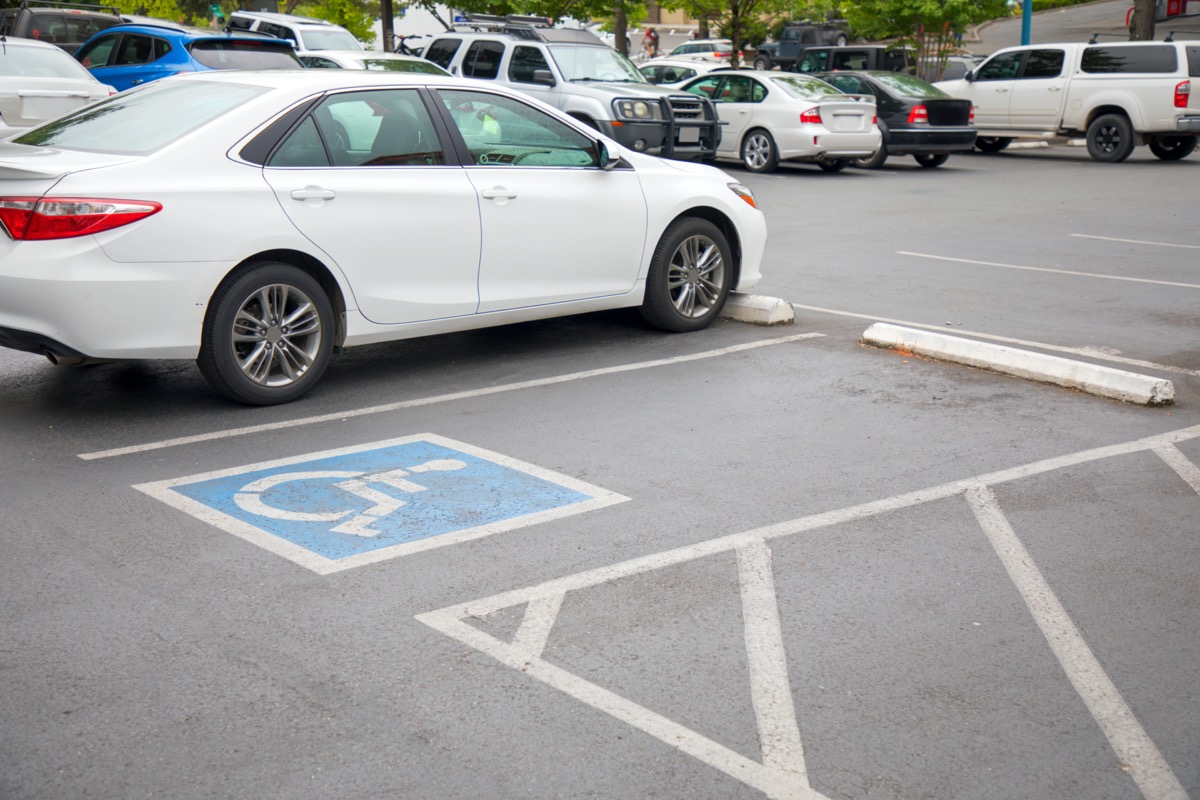
Maybe the two alarm clocks we just mentioned didn't go off and you're late for your appointment. That's still not an excuse to park in a disabled spot near the doctor's office when you are not disabled. "There are more ticketers near medical buildings and major intersections. No matter your state, fines and penalties are substantial—there is no excuse," says Aranda. And once you park don't yell at someone parked in a disability spot just because you did not see a disability. "There are many disabilities that are invisible and rare, like Ehlers-Danlos syndrome, dysautonomia and early diabetes," points Aranda.
The Rx: Check the traffic and weather condition and add extra 10 minutes before you leave and be nice to other people. "Being less judgmental is good for your soul," says Aranda. And to get through this pandemic at your healthiest, don't miss these 35 Places You're Most Likely to Catch COVID.
Source: https://www.eatthis.com/things-you-should-never-do-at-the-doctors-office/
0 Response to "Healthcare Funny Video I Dont Need a Diamond Ring Just Put Me on Your Healthcare"
Post a Comment